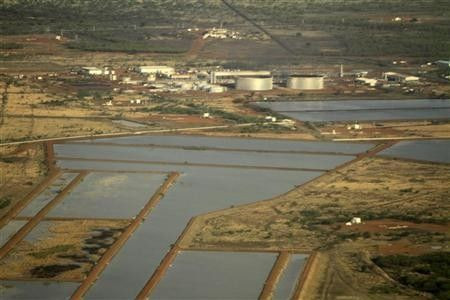Sudan says halted South Sudan govt oil exports

Sudan said on Monday it had halted landlocked South Sudan's oil exports until the two agree on a transit fee, stepping up a row between the two old civil war foes over how to untangle their once-integrated oil industries.
South Sudan seceded on July 9, taking about three-quarters of the formerly united country's roughly 500,000 barrels per day (bpd) of oil production -- the lifeblood of both economies.
The new nation still relies on a pipeline running north through Sudan to a Red Sea port to export crude, but the two sides have not agreed how much South Sudan should pay to send its oil through Sudan.
Officials decided to stop the government of South Sudan's oil exports - roughly 200,000 bpd - on November 17, Ali Ahmed Osman, Sudan's acting oil minister, told reporters, adding the pipeline was still running and international firms would not be affected.
We stopped exportation of the southern oil. We gave them four months free, without any sort of agreement, he said, adding Sudan would not resume the exports until the two sides reached an agreement over the transit fee.
South Sudan has been selling about 200,000 bpd of oil since it declared independence, according to figures provided by the country's petroleum ministry last week.
Elizabeth James Bol, South Sudan's deputy oil minister, sharply criticised Sudan's move. We consider it a sign of irresponsible and abusive anger which does not show any sense of leadership in the government of Sudan, she told reporters.
I assure highly that we will protect the sovereignty of South Sudan and we will have complete national ownership of the oil sector in South Sudan.
Sudan had been allowing South Sudan to continue exporting crude without a final agreement on the expectation that the fees would be paid after a deal.
Osman said South Sudan already owed Sudan some $727 million in arrears for the period between July 9 and the end of October.
Sudan previously blocked a shipment of South Sudan's oil in August, and said it was asking for a transit fee of $32 per barrel. South Sudan rejects the figure as too high.
Before South Sudan seceded, the two governments split revenues from southern oil roughly 50-50.
WE'RE NOT GOING TO STOP ANY COMPANY
International companies would be allowed to continue exporting their shares of oil normally, Osman said, because only shares belonging to South Sudan's government would be blocked.
We're not going to shut the pipeline, we're not going to shut any well, we're not going to stop any company, because we have an agreement with the companies. The share of the companies will be exported, he said.
But a South Sudan oil official said a 600,000 barrel oil shipment sold by South Sudan to China's Unipec did not load as scheduled on Monday because of Sudan's decision to halt South Sudan's oil exports.
A 1 million barrel oil shipment sold to trading house Vitol is due to load on Tuesday but will not unless there is a change of mind today, Macar Aciek Ader, undersecretary at South Sudan's ministry of petroleum and mining, told Reuters.
We were supposed to load 600,000 barrels today, but it didn't load, he said by telephone, adding the buyer was Unipec, trading arm of China's top refiner Sinopec Corp.
Documents provided by the ministry to reporters later confirmed the buyers and quantities of oil. Vitol's shipment was Dar Blend and Unipec's was Nile Blend, the documents showed.
Oil accounts for some 98 percent of South Sudan's government revenues.
South Sudan has repeatedly threatened to build an alternative pipeline to export its crude, but analysts say this has little prospect of becoming viable soon because it requires fresh oil finds and an end to unrest in oil-producing areas.
South Sudan split off into the world's newest country after voting overwhelmingly for independence in a January referendum promised in a 2005 peace deal that ended decades of civil war with the north.
Oil was one of the factors behind the conflict, which killed an estimated 2 million people.
© Copyright Thomson Reuters 2024. All rights reserved.





















